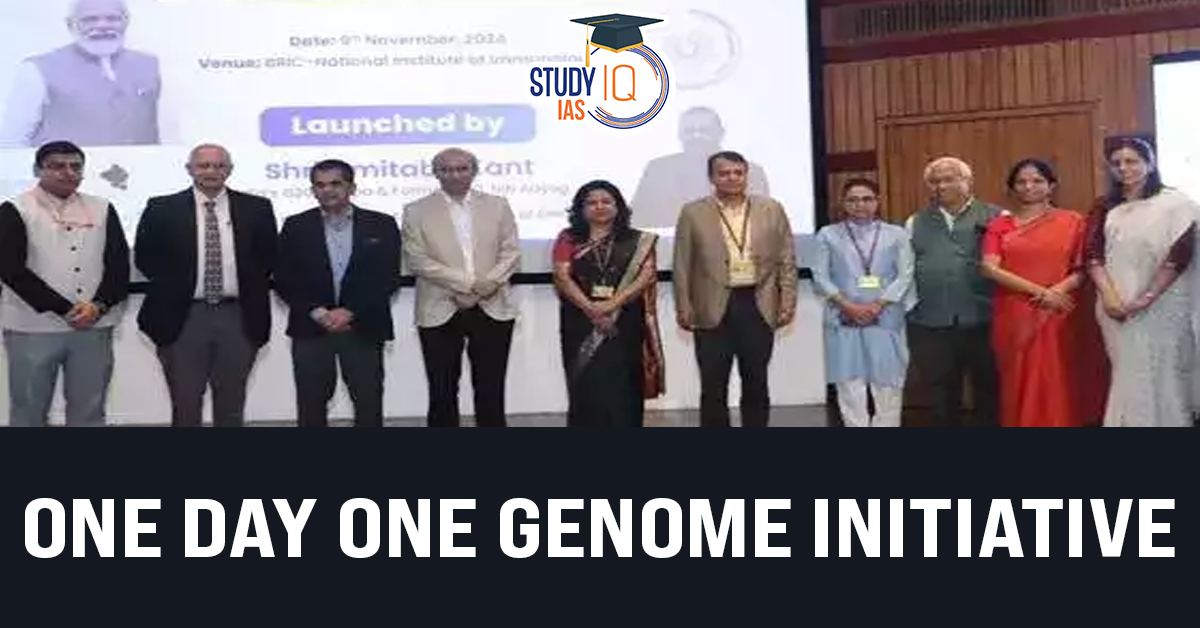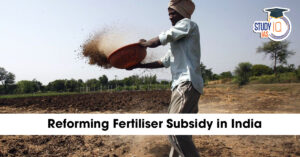Table of Contents
The ‘One Day One Genome’ initiative launched by the Department of Biotechnology (DBT) and the Biotechnology Research and Innovation Council (BRIC) on November 9, 2024, marks a significant milestone in India’s pursuit of harnessing its microbial biodiversity. This project, unveiled during the first foundation day of BRIC at the National Institute of Immunology (NII) in New Delhi, aims to sequence unique bacterial genomes found across the country. The initiative is designed to explore the vital roles that these microorganisms play in agriculture, human health, and the environment, with a focus on making this genomic data publicly available to spur innovation and research.
Background and Context
India is known for its rich biodiversity, and its microbial diversity is no exception. Microorganisms, including bacteria, fungi, and viruses, are essential players in maintaining the ecological balance. They contribute to the biogeochemical cycles, aid in the degradation of pollutants, support nitrogen fixation in agriculture, and even play a crucial role in human health.
Despite their importance, the microbial world remains largely unexplored in India, particularly in terms of genomic data. The ‘One Day One Genome’ initiative aims to bridge this gap by sequencing bacterial genomes that are unique to India and releasing this data to the public for free use. This effort will not only contribute to scientific advancements but will also offer practical solutions in various sectors, including agriculture, healthcare, and environmental management.
Objectives of the ‘One Day One Genome’ Initiative
The initiative has several core objectives that align with India’s broader goals of sustainable development, scientific innovation, and global leadership in biotechnological research. These include:
- Mapping India’s Microbial Diversity: The primary aim is to identify and sequence unique bacterial species found across India, each playing specific roles in their respective ecosystems.
- Unlocking Microbial Potential: By sequencing genomes, the initiative seeks to explore the untapped potential of microbes for producing valuable bioactive compounds, enzymes, and antimicrobial agents, which can revolutionize healthcare and industrial processes.
- Promoting Sustainable Agricultural Practices: Microbes are crucial for soil fertility, pest control, nitrogen fixation, and plant stress resistance. This initiative will contribute to sustainable agriculture by improving microbial interventions in crop production.
- Advancing Human Health: Understanding the human microbiome and its symbiotic relationship with pathogenic microorganisms will help in the development of new therapies, antibiotics, and vaccines, particularly in the fight against antimicrobial resistance.
- Contributing to Environmental Protection: Microbes play a critical role in environmental sustainability, including waste degradation, bioremediation, and the breakdown of pollutants. Genome sequencing can enhance our ability to utilize microbes for these purposes.
- Public Accessibility of Data: One of the most significant aspects of the initiative is its commitment to free access to sequenced microbial genomes, alongside graphical summaries, infographics, and technical data. This ensures that the data is accessible not only to researchers but also to industry professionals, policymakers, and the general public.
Importance of Microorganisms in Ecosystems
Microorganisms are often called the unsung heroes of nature. Their roles in biogeochemical cycles such as nitrogen, carbon, sulfur, and phosphorus cycles are indispensable. In ecosystems, they contribute to:
- Soil Formation and Fertility: Microbes are essential for soil health. They break down organic matter, making nutrients available to plants and ensuring the cycling of key elements like nitrogen.
- Waste Degradation: Microorganisms degrade organic waste, transforming it into less harmful substances. This includes breaking down pollutants and toxic compounds, making them vital for bioremediation.
- Plant-Microbe Symbiosis: Microbes assist in the uptake of nutrients and water by plants, enhancing growth and resilience, especially in challenging environments.
- Carbon Sequestration: Microbes also play a role in carbon sequestration, which is crucial for mitigating climate change.
Microorganisms in Agriculture
In India, where agriculture plays a central role in the economy, microbial applications can significantly boost productivity. Microorganisms aid in:
- Nitrogen Fixation: Certain bacteria, like Rhizobium, help plants convert atmospheric nitrogen into a form that plants can use, reducing the need for chemical fertilizers.
- Pest and Disease Control: Microbes such as Bacillus thuringiensis can be used as biopesticides, reducing dependence on harmful chemical pesticides.
- Improving Soil Fertility: Microbial inoculants can enhance soil health by promoting phosphorus solubilization and organic matter decomposition, ensuring sustainable farming practices.
Human Health: The Microbiome Revolution
The human microbiome consists of trillions of microorganisms that reside in our body, particularly in the gut. These microbes are essential for:
- Digestion: Microorganisms help break down complex carbohydrates, proteins, and fats.
- Immunity: A balanced microbiome supports the immune system, preventing infections and autoimmune diseases.
- Mental Health: The gut-brain axis suggests that microbiomes also influence mental health, affecting conditions like depression and anxiety.
Research into microbial genomics will allow scientists to better understand the relationship between human health and the microbiome, leading to innovations in probiotics, gut health therapies, and new drug development.
Genomic Sequencing: The Power of Data
Genome sequencing is a powerful tool that allows scientists to decode the DNA of microorganisms, identifying their genetic makeup and the specific functions they perform. For the ‘One Day One Genome’ initiative, sequencing will uncover:
- Microbial Enzymes: These enzymes can be used in industries like biotechnology, pharmaceuticals, and food processing.
- Antimicrobial Resistance Genes: Understanding how microbes resist antibiotics will help in developing more effective antibiotics and combatting resistance.
- Bioactive Compounds: Microbes produce bioactive compounds that have medicinal properties, such as antibiotics, anti-inflammatory agents, and antioxidants.
Data Accessibility and Open Science
One of the most important aspects of the ‘One Day One Genome’ initiative is the open access to sequenced microbial data. This will allow:
- Global Collaboration: Researchers around the world will be able to contribute to and benefit from the genomic data, fostering international collaboration.
- Industry Applications: Industries working in biotechnology, agriculture, and healthcare can use the data to innovate and create new products.
- Public Engagement: Making this data available to the public fosters awareness and interest in microbial science, encouraging further research and innovation.
Conclusion
The ‘One Day One Genome’ initiative is a landmark project that underscores the potential of India’s rich microbial diversity in addressing global challenges in agriculture, health, and the environment. By sequencing bacterial genomes and making this information freely available, the initiative will fuel scientific innovation and sustainable development. It has the potential to revolutionize biotechnology, healthcare, and environmental management while contributing to India’s leadership in biotechnological research on the global stage.
Through this initiative, India can unlock new avenues for sustainable agriculture, healthcare solutions, and environmental protection, ensuring that the country continues to thrive in the face of global challenges. As India takes the lead in this genomic revolution, the ‘One Day One Genome’ initiative will undoubtedly have a lasting impact on science, society, and the global community.


 Industrial Parks in India: Driving Manuf...
Industrial Parks in India: Driving Manuf...
 National Maritime Heritage Complex (NMHC...
National Maritime Heritage Complex (NMHC...
 Reforming Fertiliser Subsidy in India: N...
Reforming Fertiliser Subsidy in India: N...

























